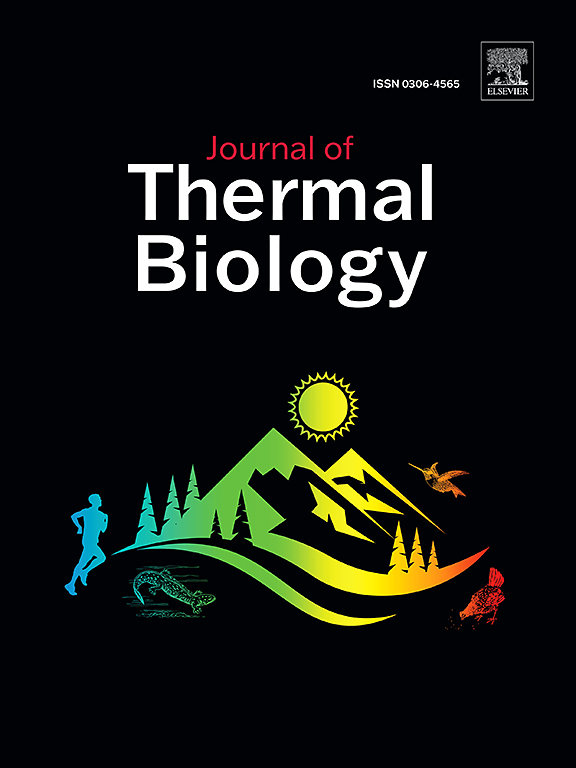METTL14 mediates SOCS1 mRNA m6A modification to regulate macrophage polarization to attenuate the mechanism of severe heat stroke lung injury
IF 2.9
2区 生物学
Q2 BIOLOGY
引用次数: 0
Abstract
Severe heat stroke is an acute pathological state triggered by high temperature, in which lung injury is a major complication and an important cause of high mortality. RNA N6-methyladenosine modification can affect macrophage polarization by regulating the stability and translation of mRNAs, which plays an important role in inflammation and tissue repair.
Methods
Establishment of severe heatstroke (HS) mice. Assessment of lung tissue changes using hematoxylin and eosin staining and immunohistochemical methods. CD206/iNOS/DAPI staining was used to detect the M1/M2 ratio. Real-time PCR was used to determine gene expression. Protein expression was determined by ELISA, Western blotting. Establishment of a heatstroke model in MH-S alveolar macrophages. Transcriptome sequencing analysis was performed to screen for differential genes, as well as expression of related signaling pathways.
Result
In vivo experiments have shown that severe pulmonary heatstroke caused an inflammatory response in lung tissue. RNA methylation modulators reduce lung tissue injury by decreasing macrophage expression while attenuating the expression of inflammatory factors. In vitro experiments showed that thermal shock significantly activated M1-type polarization in alveolar macrophages, induced activation of the NF-κB signaling pathway, and up-regulated the expression of the METTL14 gene and related inflammatory genes.
Conclusion
METTL14 significantly attenuates lung injury induced by severe heatstroke. This process is associated with its role in modulating the m6A modification of SOCS1 mRNA, which in turn affects the polarization state of macrophages and promotes the conversion from M1-to M2-type. This provides a new molecular target and theoretical basis for the treatment of severe heatstroke.
METTL14介导SOCS1 mRNA m6A修饰,调控巨噬细胞极化,减轻重症中暑肺损伤机制。
重症中暑是高温诱发的急性病理状态,肺损伤是重症中暑的主要并发症和高死亡率的重要原因。RNA n6 -甲基腺苷修饰可通过调节mrna的稳定性和翻译影响巨噬细胞极化,在炎症和组织修复中发挥重要作用。方法:建立严重中暑(HS)小鼠。利用苏木精和伊红染色及免疫组织化学方法评估肺组织变化。CD206/iNOS/DAPI染色检测M1/M2比值。Real-time PCR检测基因表达。ELISA、Western blotting检测蛋白表达。MH-S肺泡巨噬细胞中暑模型的建立。转录组测序分析筛选差异基因,以及相关信号通路的表达。结果:体内实验表明,严重的肺中暑可引起肺组织的炎症反应。RNA甲基化调节剂通过降低巨噬细胞表达和降低炎症因子表达来减轻肺组织损伤。体外实验表明,热休克显著激活肺泡巨噬细胞m1型极化,诱导NF-κB信号通路激活,上调METTL14基因及相关炎症基因表达。结论:METTL14可明显减轻重症中暑所致肺损伤。这一过程与其调节SOCS1 mRNA的m6A修饰作用有关,进而影响巨噬细胞的极化状态,促进m1型向m2型转化。这为重症中暑的治疗提供了新的分子靶点和理论依据。
本文章由计算机程序翻译,如有差异,请以英文原文为准。
求助全文
约1分钟内获得全文
求助全文
来源期刊

Journal of thermal biology
生物-动物学
CiteScore
5.30
自引率
7.40%
发文量
196
审稿时长
14.5 weeks
期刊介绍:
The Journal of Thermal Biology publishes articles that advance our knowledge on the ways and mechanisms through which temperature affects man and animals. This includes studies of their responses to these effects and on the ecological consequences. Directly relevant to this theme are:
• The mechanisms of thermal limitation, heat and cold injury, and the resistance of organisms to extremes of temperature
• The mechanisms involved in acclimation, acclimatization and evolutionary adaptation to temperature
• Mechanisms underlying the patterns of hibernation, torpor, dormancy, aestivation and diapause
• Effects of temperature on reproduction and development, growth, ageing and life-span
• Studies on modelling heat transfer between organisms and their environment
• The contributions of temperature to effects of climate change on animal species and man
• Studies of conservation biology and physiology related to temperature
• Behavioural and physiological regulation of body temperature including its pathophysiology and fever
• Medical applications of hypo- and hyperthermia
Article types:
• Original articles
• Review articles
 求助内容:
求助内容: 应助结果提醒方式:
应助结果提醒方式:


